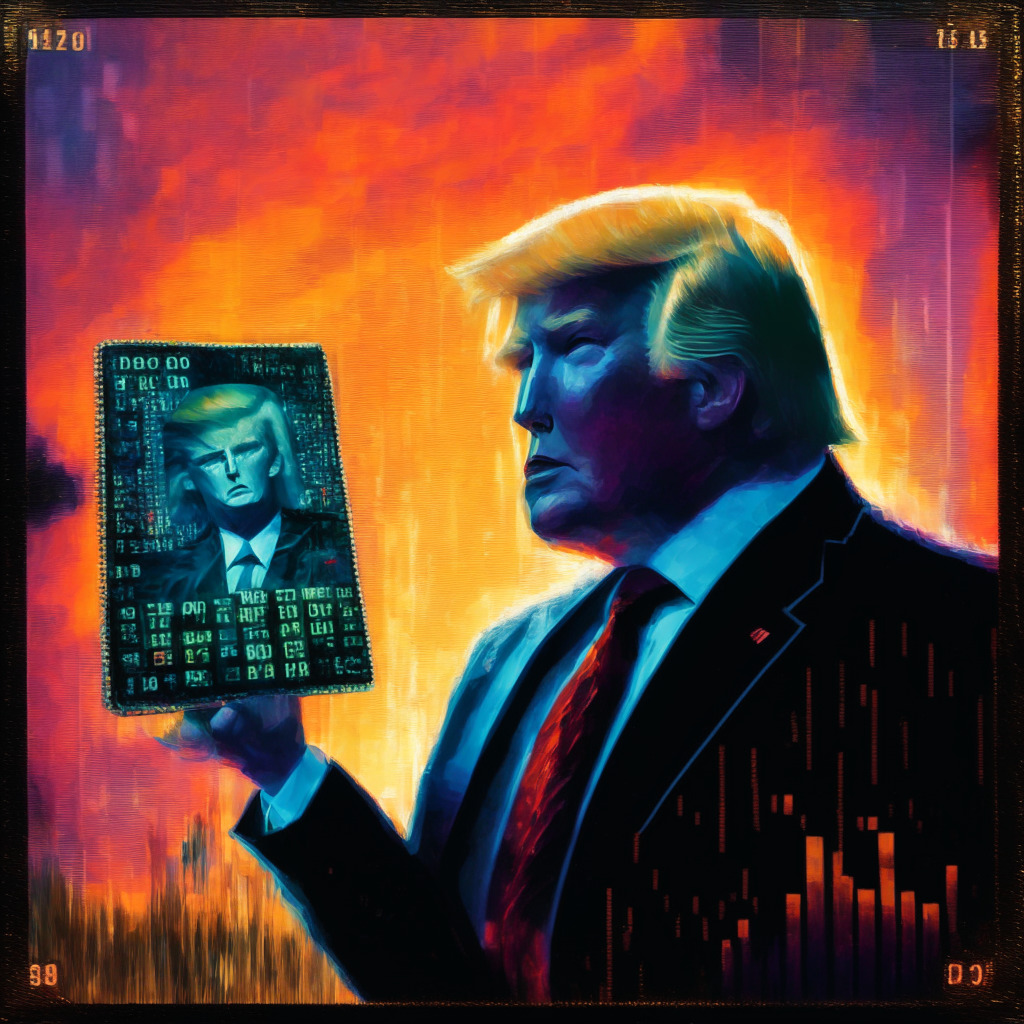The popular blockchain scaling solution, Polygon, recently had two wallets flagged for transferring substantial MATIC tokens to Binance, raising alarm for potential dumping. However, Polygon Labs founder refuted these allegations as a mislabeling error. The intricacies surrounding wallet flagging and token transfers remind crypto enthusiasts of the importance of in-depth understanding and avoiding premature judgment based solely on surface-level information.
Search Results for: POL
Navigating the Waters of Crypto Regulation: IMF & FSB Unveil Joint Policy Paper
“The IMF and FSB published a joint policy paper regarding the future of crypto regulation, focusing on stablecoins and decentralized finance (DeFi). While it offers guidance, it establishes no new policies, emphasizing the need for an effective balance between paper recommendations and practical application.”
Google’s AI Policy Update: A Step Towards Transparency or an Ethical Minefield?
Google’s recent policy update mandates disclosure of AI-generated content in political ads, aiming to increase transparency and ethics in AI. The policy will apply to image, audio, and video content from mid-November 2023 onwards. However, this doesn’t solve all AI ethics issues, especially given the rise of Deepfakes.
The US: Falling Behind In The Blockchain Race? Evaluating Current Policies and Ambitions
Chris Larsen, Ripple Labs’ Chair, criticized the current Biden administration’s approach to cryptocurrency policy, suggesting its ambiguity has caused confusion within the sector. Larsen also argued that current policies push the industry offshore, naming Dubai, Singapore, and London as emerging global blockchain capitals. Meanwhile, the race for the first US spot Ethereum ETF is heating up.
Poland’s Rise as the Blockchain Hub: Reflections from ETH Warsaw Event
“Poland is bolstering its status as a significant blockchain hub within the EU, with ETH Warsaw, the region’s largest blockchain event. The conference highlighted innovation in the crypto world, expressed growing employment preference for those proficient with Web3 and notably recognized the potential of digital currencies and blockchain technology in transforming traditional markets.”
Unraveling the Tax Conundrum in the Metaverse: A Closer Look at Virtual Economies and Policies
Harvard legal scholar, Christine Kim, proposes a shift in tax principles for the ‘metaverse’. Economic activities involving virtual assets could be considered taxable. She outlines models for tax collection, accounting for potential resistance and discusses possibilities for taxing unrealized gains. Managing tax evasion and accurately valuing new assets are identified as challenges.
Harnessing Politics to Navigate DAOs: A Balance of Efficiency and Decentralization
“Decentralized Autonomous Organizations (DAOs) aim to balance efficiency and decentralization, akin to political organizations. Despite their distinct advantages, DAOs often face challenges like flawed governance, communication issues, and skewed participation leading to diluted long-term objectives. Strategies from politics, including electing representatives and preference-based decision-making, could be instrumental in overcoming these drawbacks.”
The New ‘Crypto-politics’: Pros and Cons of Accepting Cryptocurrency Donations in Political Campaigns
“Florida’s Governor, Ron DeSantis, plans to announce the acceptance of crypto donations for his 2024 campaign, an interesting turn from traditional funding. However, cryptocurrency donations introduce complexity regarding traceability and potential misuse. The political landscape’s inherent unpredictability combined with cryptocurrency’s volatility invite intriguing consequences.”
Unveiling Polygon’s Open Source Developer Stack: Scalability Promise vs. Skepticism
Polygon’s new open-source sidechain developer stack is set to power Layer 2 solutions on Ethereum, backing its commitment to the evolution of the Ethereum ecosystem. Key to this advancement is the integration of zero-knowledge proof technology, considered critical for the scaling of the Ethereum blockchain. However, critics raise concerns about potential inefficiencies and differing architecture.
Crypto Campaign Donations: Revolutionizing Political Funding or Publicity Stunt?
“Crypto campaign donations are gaining traction in the political arena, with key figures including Florida Governor, Ron DeSantis, considering their acceptance. Yet, concerns over their implications prompt considerations for regulations and possible contribution limitations.”
Polygon’s Ambitious Leap: Is The Cryptoworld Ready for the ZK-Powered Value Layer?
Ethereum scaling firm Polygon has unveiled a toolkit for blockchain developers to create customized Layer 2 chains with zero-knowledge (ZK) proofs. This opens up potentials for evolving ‘Supernets’ using the firm’s ZK technology, aiming to build the “Value Layer of the internet”.
Cryptocurrency Platforms’ Struggle: Workforce Reduction amid Bearish Markets & Rigid Tax Policies
“Indian cryptocurrency platform CoinSwitch reduced its customer support division by over a third due to decreasing market activity, affecting 44 employees. This follows the company’s expansion where it hired around 60 individuals to increase overall efficiency. The dwindling cryptocurrency market and rigorous Indian tax policy are core factors behind these changes.”
Navigating Regulatory Hurdles: Binance Continues Belgian Operations via Poland Amid EU Changes
Binance will continue serving Belgian users despite previous AML and CFT violations by transferring operations to its Polish entity, Binance Poland. Belgian users will now adhere to Poland’s KYC regulations. This comes amid upcoming EU crypto regulations in 2024.
Bitcoin’s Future: Influenced by Federal Reserve Policies or Independent Market Stalwart?
“The co-founder of BitMEX, Arthur Hayes, shares an optimistic view of Bitcoin’s future, driven by critique of Federal Reserve’s contentious strategies. Bitcoin is seen as an antidote to banking anomalies, growing fiat liquidity, and may face potential surges or falls.”
Surge in Trump NFTs: A Lesson in Politics, Public Figures and Cryptocurrency Future
“The cryptocurrency landscape, marked by public figures, legislation, and real-world events, recently saw a spike in Donald Trump NFTs following his criminal case’s news. This amplifies how such events influence cryptosphere, with the Trump NFT prices experiencing a 62% increase.”
Regulating Crypto – Exploring Opportunities and Risks Amidst Politics, Real Estate and Federal Policies
“Miami Mayor, Francis Suarez, continues to push for crypto adoption, advocating for Bitcoin compensation. Meanwhile, Bitcoin-powered real estate opportunities emerge in the Cayman Islands. As for Bitcoin’s future price, a potential value of $27,400 is suggested, with an optimistic rise to $30,300, or a bearish plunge to $24,100.”
Blockchain Based Prediction Markets: A Glimpse into the Future of Political Betting
“Blockchain-based prediction markets like Polymarket are gaining momentum as an alternative indicator for political outcomes. Despite their contested legal status, they offer unique insight into public sentiment, recording shifts in standing following events like debates. Fueled by millions in bets, these platforms may set records this election cycle, despite potential regulatory hurdles.”
Navigating the Ethical Minefield of AI: Polite Bots, Deepfakes, and Job Security
“The proliferation of AI comes with both promises and perils. Increased AI interaction raises questions about our behavior towards technology and its impact on our human interactions. As AI’s capabilities expand, from solving CAPTCHAs faster than humans to possible misuse with deepfake technology, skepticism and scrutiny are crucial for a safe journey into an AI-powered future.”
Crypto in Politics: RFK Jr’s Support for Bitcoin & Deep Dive into Current Market Trends
U.S. presidential candidate Robert F. Kennedy Jr. has voiced support for Bitcoin, promising to remove capital gains taxes on cryptocurrencies if elected. His stance adds an interesting perspective, while the fluctuating crypto market continues to affect prices. Notably, Toncoin, Sonik Coin, Binance Coin, Launchpad XYZ, and Tron exhibit promising dynamics amid market volatility.
Cryptosphere Meets Politics: Thailand’s New Crypto-Savvy Prime Minister’s Impact on Blockchain Future
Thailand’s newly appointed Prime Minister, Srettha Thavisin, with notable ties to the cryptocurrency world, poses possible positive implications for Thailand’s crypto jurisdiction. Despite concerns over the misuse of blockchain’s anonymity, Thavisin’s commitment to combat poverty and his government’s recent decision on crypto tax breaks hint at a potentially crypto-friendly future.
Advocacy Group Coin Center Pushes for More Refined Crypto Tax Policies
Crypto policy experts at Coin Center are advocating for a better tax policy for digital assets. They propose a nominal exemption for small crypto transactions, no tax on block rewards until sold, and simpler methods for determining cryptocurrency donation amounts. They also emphasize the need for tax policy clarity for third-party non-custodial intermediaries in digital asset transactions.
Blockchain at the Helm: Thailand’s Prime Minister and His Bold Crypto Policies
Former Sansiri CEO, now Thai Prime Minister, Srettha Thavisin, known for his contributions to the digital asset industry, plans to introduce a national token scheme. Despite facing criticism over cost and feasibility, Thavisin’s crypto-supportive stance signals a potential shift in crypto regulations and development within Thailand.
Brazilian Police Freeze Crypto Wallets in Major Fraud Crackdown: Necessary or Overreach?
Brazilian police recently conducted an operation “Spin-Off”, targeting suspected electronics-trading fraudsters, freezing their cryptocurrency assets. The crimes involved moving vast amounts of crypto into “paper” companies, masking origin and purpose from overseas vendors. The case poses questions regarding crypto regulation to prevent potential crimes.
Crypto Politics: A Game-Changer in the 2024 US Elections Pros and Cons
“Crypto is becoming a vital topic in the US electoral campaign, with notable enthusiasts Governor Ron DeSantis and Vivek Ramaswamy promoting a future centered on digital currencies. Both forecast a future where digital assets disrupt traditional finances, shaping blockchain’s future.”
Surge in Stablecoin Use Amid Argentina’s Political Turmoil: A Deep Dive into Crypto’s Role in National Economy
Amidst Argentina’s economic crisis and hyperinflation, Argentinians are significantly increasing their purchase of stablecoins as a viable way to protect their savings. The trend, spurred by government restrictions on foreign currency buying and a depreciating peso, also sees an increasing number of transactions and salaries being paid in cryptocurrencies. The upsurge coincides with the rise of presidential candidate, Javier Milei, who holds a positive stance towards cryptocurrencies.
Uncovering the Political Bias in AI Chatbots: A Deep-Dive into OpenAI’s ChatGPT
“AI chatbot, ChatGPT, developed by OpenAI, has shown a tendency towards left-leaning responses in its discussions of political issues. The emission of bias might be a result of biased training data or the algorithm itself. Although AI brings advancements, biases and security concerns must be mitigated for safe adoption.”
Surge of Bitcoin in Argentina: A Result of Political Shifts or an Inflation Hedge?
“Bitcoin has surged in Argentina following the primary win of Bitcoin-friendly candidate, Javier Milei, attaining new highs in Argentine’s crypto market. Interestingly, this rise is tied to Milei’s successful run, who plans to abolish the central bank and sees Bitcoin as a counter against inflation exploitation.”
Cryptocurrency, Politics and Law: The Intriguing FTX Saga Unfolds
Former FTX executive, Ryan Salame, is under scrutiny for alleged illegal campaign donations, specifically using customer funds amounting to $24 million. This news intensifies intrigue surrounding the FTX saga, with assertions implicating a potentially orchestrated bipartisan donation strategy to favor pro-crypto politicians.
Digital Energy Council: Sustaining Crypto Mining and Shaping Policymaking in Digital Assets
The Digital Energy Council, a group dedicated to cryptocurrency miners, has been introduced as a crucial intermediary for discussions about crypto mining sustainability, and policy advancement with Washington-based policymakers. This initiative prioritizes miners’ interests while ensuring compliance with U.S. energy laws, aiming to promote responsible energy development and national security.
US Lawmakers, SPBD Licenses, and Crypto: Unraveling a Tangled Web of Regulation and Politics
US lawmakers have raised concerns over the issuance of a Special Purpose Broker-Dealer license to Prometheum amid questions about its operations and alleged ties to the Chinese Communist Party. Meanwhile, Coinbase is advocating for pro-crypto political figures, despite controversies which cast a shadow over its initiative. The future of crypto regulation remains unpredictable.
Auradine’s Stunning $81 Million Debut Funding: Bold Vision or Just a Polished Pitch Deck?
Crypto startup, Auradine remarkably secured $81 million in its first funding round without a product or a single customer. The vision is to fabricate hardware for Bitcoin mining, enhanced cryptography, and artificial intelligence. The company also attracted “inbound interest for a follow-on round of funding.”
The Potential Convergence of Expansionist Fiscal Policies and Bitcoin: A Strategic Future Investment
“The convergence of expansionist fiscal policies and monetary measures would bolster bitcoin’s position long term as a safeguard against fiat currency devaluation and imprudent expenditure. Integrating cryptocurrencies into portfolios could offer diversified exposure to unconventional risk sources usually tied to traditional balances.”































